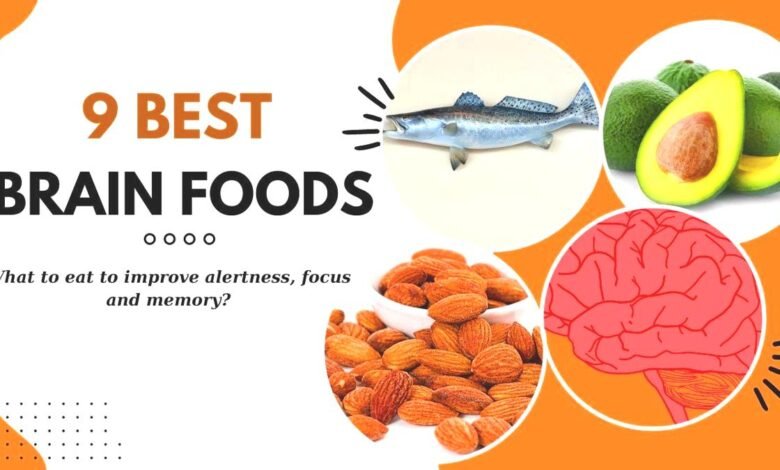9 Best Foods to Boost Your Brain and Memory

In today’s fast-paced world, maintaining optimal brain health and memory function is crucial. While mental exercises and a healthy lifestyle play a significant role, the food we consume also has a profound impact on our cognitive abilities. Certain nutrients and compounds found in foods have been linked to enhanced brain function, memory retention, and overall cognitive performance. In this article, we will explore the nine best foods that can help boost your brain and memory. Improve your memory and sharpen your mind with these delicious and nutritious options.
Our brain requires proper nourishment to function optimally, and incorporating brain-boosting foods into our diet can significantly improve cognitive abilities and memory retention. By understanding the impact of various nutrients and compounds on brain health, we can make informed dietary choices to support our mental well-being.
Read More: How Mental Health Treatment Can Change The Brain
Blueberries: Nature’s Brain Boosters
Blueberries, often referred to as “brain berries,” are rich in antioxidants that combat oxidative stress and reduce inflammation in the brain. These tiny fruits are packed with flavonoids, which have been linked to improved memory and cognitive functions. Regular consumption of blueberries has shown promising results in slowing down age-related cognitive decline.
Fatty Fish: Omega-3 Rich Delights
Fatty fish, such as salmon, trout, and sardines, are excellent sources of omega-3 fatty acids. These healthy fats are essential for brain health and play a crucial role in building brain cell membranes. Omega-3 fatty acids have been associated with improved memory, focus, and reduced risk of age-related cognitive decline. Include fatty fish in your diet at least twice a week to reap its brain-boosting benefits.
Turmeric: The Golden Spice for Cognitive Health
Turmeric, a vibrant yellow spice commonly found in curry dishes, contains a compound called curcumin. Curcumin possesses potent anti-inflammatory and antioxidant properties, which can benefit brain health. Studies have indicated that curcumin can enhance memory and stimulate the production of brain-derived neurotrophic factor (BDNF), a protein that promotes brain cell growth and protects against cognitive decline.
Broccoli: A Brain-Boosting Cruciferous Vegetable
Broccoli, a cruciferous vegetable, is rich in antioxidants and other plant compounds that support brain health. It is an excellent source of vitamin K, which is known to enhance cognitive function and improve memory. Additionally, broccoli contains compounds called glucosinolates that can slow down the breakdown of acetylcholine, a neurotransmitter essential for the formation of new memories.
Pumpkin Seeds: Nutritional Powerhouses for the Mind
Pumpkin seeds are a nutritional powerhouse, packed with various nutrients beneficial for brain health. They are an excellent source of magnesium, iron, zinc, and copper, which play vital roles in brain function and development. These seeds also contain antioxidants that protect the brain from free radical damage. Incorporate pumpkin seeds into your diet as a healthy snack or sprinkle them over salads or oatmeal.
Avocados: Brain-Healthy Fruit with Healthy Fats
Avocados are not only delicious but also packed with nutrients that support brain health. They are rich in healthy fats, particularly monounsaturated fats, which contribute to healthy blood flow and reduce the risk of hypertension. The high levels of vitamin E found in avocados also help protect the brain from oxidative stress and promote cognitive function. Add sliced avocados to salads, spread them on toast, or enjoy creamy guacamole to reap the brain-boosting benefits of this versatile fruit.
Oranges: Vitamin C for Cognitive Enhancement
Oranges and other citrus fruits are well-known for their high vitamin C content. Vitamin C is a powerful antioxidant that helps protect the brain from oxidative stress caused by free radicals. Studies have shown that vitamin C can reduce the risk of cognitive decline and support overall brain health. Include fresh oranges or drink freshly squeezed orange juice to enjoy the benefits of this brain-boosting fruit.
Nuts and Seeds: Smart Snacks for Brain Health
Nuts and seeds, such as almonds, walnuts, and flaxseeds, are excellent sources of nutrients that promote brain health. They are rich in omega-3 fatty acids, antioxidants, vitamin E, and other essential nutrients that nourish the brain. Regular consumption of nuts and seeds has been associated with improved cognition, memory, and overall brain function. Add a handful of mixed nuts or seeds to your daily snack routine for a brain-boosting treat.
Green Tea: A Refreshing Brew for Cognitive Function
Green tea, known for its calming properties and numerous health benefits, also offers advantages for brain health. It contains caffeine, which can improve alertness and focus, aiding in cognitive performance. Moreover, green tea is rich in antioxidants, including catechins and polyphenols, which have been associated with a reduced risk of cognitive decline and improved memory function. Enjoy a cup of green tea as a soothing beverage option that promotes both mental relaxation and enhanced cognitive abilities.
Read More: The Power of Sleep: How Restful Nights Improve Your Health
Conclusion
Maintaining a healthy brain and memory function is essential for a fulfilling life. By incorporating the nine brain-boosting foods mentioned above into your diet, you can provide your brain with the necessary nutrients to enhance cognitive abilities, improve memory retention, and protect against age-related cognitive decline. Remember to combine a brain-healthy diet with regular exercise, quality sleep, and mental stimulation for optimal brain health.
FAQs
1. Can these brain-boosting foods replace mental exercises?
While brain-boosting foods provide valuable nutrients, they should complement mental exercises rather than replace them. Both aspects are essential for optimal brain health.
2. How many of these foods should I consume to see the benefits?
Incorporating these foods into your diet regularly is beneficial. However, consult a healthcare professional or nutritionist for personalized advice based on your specific needs.
3. Can children benefit from these brain-boosting foods?
Absolutely! Children’s developing brains can benefit from the nutrients found in these foods. Encourage a balanced diet that includes brain-boosting options.
4. Are there any potential allergies or side effects associated with these foods?
While these foods are generally safe and well-tolerated, individuals with specific allergies or medical conditions should consult their healthcare provider before making significant dietary changes.
5. Can supplements provide the same benefits as consuming these foods?
Whole foods offer a broader range of nutrients and compounds, making them the preferred choice. Supplements should only be taken under the guidance of a healthcare professional when necessary.







